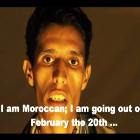Morocco moves for dignity

Moroccan youth organised protests through YouTube, Twitter and Facebook, just like activists across the Arab world. But are their aims the same? Jillian C York reports
(more…)

Moroccan youth organised protests through YouTube, Twitter and Facebook, just like activists across the Arab world. But are their aims the same? Jillian C York reports
(more…)

Eric Avebury outlines the systematic repression that has brought the people of Bahrain onto the streets
(more…)
Belarusian dissident Vasily Parfenkov has been sentenced to four years of imprisonment following his hearing on Thursday. He was convicted of breaking the window of a parliamentary building during protests against President Lukashenko’s re-election on 19 December. He will also have to pay pay 14m roubles ($4,700) in compensation for damage to state property. Parfenkov is an active supporter of opposition candidate Vladimir Neklyayev.
A solidarity rally in support of Belarus’s political prisoners is being held at the Belarusian Embassy in London on Saturday 19 February.
Thursday 17 February saw the beginning of the hearing against Vasil Parkiankou. The trial, which is being held in Minsk, has been described by an opposition activist as a mere “show trial”. Parkiankou is accused of smashing the windows of a government building in the course of a demonstration in December. This is a “public order offence”. He was protesting against vote rigging in the presidential election. Human rights organisation Viasna have said that more than 40 opposition members will be tried. They face up to 15 years of imprisonment.
This Saturday there will be a solidarity protest outside the Belarusian Embassy in London.